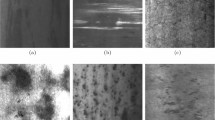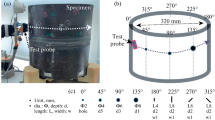Abstract
The magnetic flux leakage (MFL) technique is widely employed for nondestructive testing of ferromagnetic specimens and materials, including wire ropes, bridge cables, and pipelines. As regards the MFL testing, extracting features from MFL signals is crucial for defect recognition and estimation of corresponding widths. Deep learning has been extensively used for feature extraction, but it often performs inadequately on a small sample dataset. To address this limitation, this paper develops a network framework that combines the Wavelet Scattering Transform (WST) and Neural Networks (NN) for defect width estimation. The WST is a knowledge-based feature extraction technique with a structure similar to convolutional neural networks. It offers a translation-invariant representation of signal features using a redundant dictionary of wavelets. The NN then maps the WST feature representation to the defect width information. Experiments on real steel plates with defects are carried out to validate the effectiveness of the proposed framework. Quantitative comparisons of the experimental results demonstrate that the proposed framework achieves better estimation performance in handling MFL signals and has superiority in scenarios with limited training samples.










Similar content being viewed by others
Data Availibility Statement
The data in the research are obtained and analyzed based on experimental measurements.
References
Bubenik, T., Nestlroth, J., Eiber, R., Saffell, B.: Magnetic flux leakage (mfl) technology for natural gas pipeline inspection. NDT E Int. 1(30), 36 (1997)
Dutta, S.M., Ghorbel, F.H., Stanley, R.K.: Dipole modeling of magnetic flux leakage. IEEE Trans. Magnet. 45(4), 1959–1965 (2009)
Shi, Y., Zhang, C., Li, R., Cai, M., Jia, G.: Theory and application of magnetic flux leakage pipeline detection. Sensors 15(12), 31036–31055 (2015)
Peng, X., Anyaoha, U., Liu, Z., Tsukada, K.: Analysis of magnetic-flux leakage (mfl) data for pipeline corrosion assessment. IEEE Trans. Magnet. 56(6), 1–15 (2020)
Jin, Z., Mohd Noor Sam, M.A.I., Oogane, M., Ando, Y.: Serial mtj-based tmr sensors in bridge configuration for detection of fractured steel bar in magnetic flux leakage testing. Sensors 21(2), 668 (2021)
Long, Y., Huang, S., Peng, L., Wang, S., Zhao, W.: A characteristic approximation approach to defect opening profile recognition in magnetic flux leakage detection. IEEE Trans. Instrum. Meas. 70, 1–12 (2021)
Li, F., Feng, J., Zhang, H., Liu, J., Lu, S., Ma, D.: Quick reconstruction of arbitrary pipeline defect profiles from mfl measurements employing modified harmony search algorithm. IEEE Trans. Instrum. Meas. 67(9), 2200–2213 (2018)
Huang, S., Peng, L., Wang, Q., Wang, S., Zhao, W.: An opening profile recognition method for magnetic flux leakage signals of defect. IEEE Trans. Instrum. Meas. 68(6), 2229–2236 (2018)
Piao, G., Guo, J., Hu, T., Leung, H., Deng, Y.: Fast reconstruction of 3-d defect profile from mfl signals using key physics-based parameters and svm. NDT & E Int. 103, 26–38 (2019)
Yu, G., Liu, J., Zhang, H., Liu, C.: An iterative stacking method for pipeline defect inversion with complex mfl signals. IEEE Trans. Instrum. Meas. 69(6), 3780–3788 (2019)
Zhang, H., Wang, L., Wang, J., Zuo, F., Wang, J., Liu, J.: A pipeline defect inversion method with erratic mfl signals based on cascading abstract features. IEEE Trans. Instrum. Meas. 71, 1–11 (2022)
Han, W., Xu, J., Wang, P., Tian, G.: Defect profile estimation from magnetic flux leakage signal via efficient managing particle swarm optimization. Sensors 14(6), 10361–10380 (2014)
Lu, S., Feng, J., Zhang, H., Liu, J., Wu, Z.: An estimation method of defect size from mfl image using visual transformation convolutional neural network. IEEE Trans. Indust. Inf. 15(1), 213–224 (2018)
Wang, L., Zhang, H., Liu, J., Qu, F., Zuo, F.: Defect size quantification for pipeline magnetic flux leakage detection system via multi-level knowledge-guided neural network. IEEE Trans. Indust. Elect. (2022)
Wu, Z., Deng, Y., Liu, J., Wang, L.: A reinforcement learning-based reconstruction method for complex defect profiles in mfl inspection. IEEE Trans. Instrum. Meas. 70, 1–10 (2021)
Bruna, J., Mallat, S.: Invariant scattering convolution networks. IEEE Trans. Pattern Anal. Mach. Intell. 35(8), 1872–1886 (2013)
Mallat, S.: Group invariant scattering. Commun. Pure Appl. Math. 65(10), 1331–1398 (2012)
Andén, J., Mallat, S.: Deep scattering spectrum. IEEE Trans. Signal Processing 62(16), 4114–4128 (2014)
Oyallon, E., Mallat, S., Sifre, L.: Generic deep networks with wavelet scattering. arXiv preprint arXiv:1312.5940 (2013)
Edwards, C., Palmer, S.: The magnetic leakage field of surface-breaking cracks. J. Phys. Appl. Phys. 19(4), 657 (1986)
Sifre, L., Mallat, S.: Rotation, scaling and deformation invariant scattering for texture discrimination. In: Proceedings of the IEEE Conference on Computer Vision and Pattern Recognition, pp. 1233–1240 (2013)
Cho, K., Van Merriënboer, B., Gulcehre, C., Bahdanau, D., Bougares, F., Schwenk, H., Bengio, Y.: Learning phrase representations using rnn encoder-decoder for statistical machine translation. arXiv preprint arXiv:1406.1078 (2014)
Acknowledgements
This work is partially supported by National Key R &D Program of China (2021YFE0204200), the Guangdong Basic and Applied Basic Research Foundation under Grant No.2019A1515111119 and No.2021A1515010926, and Shenzhen Science and Technology Program under Grant No.JSGG20210802154539015.
Author information
Authors and Affiliations
Contributions
ZF: Methodology, Analysis and interpretation of data, Software, Writing-Review & Editing. MZ: Conceptualization, Data curation, Validation, Writing-Review & Editing. HQ: Supervision, Writing-Review & Editing. ND: Project administration, Supervision. NL: Validation, Writing-Review & Editing.
Corresponding authors
Ethics declarations
Conflicts of interest
The authors declare that there is no Conflict of interest.
Ethics Approval
This paper has not been submitted simultaneously to any other journal. The paper has not been published previously. All the authors have reviewed the final version of the manuscript and consent to participate in the publication.
Additional information
Publisher's Note
Springer Nature remains neutral with regard to jurisdictional claims in published maps and institutional affiliations.
Rights and permissions
Springer Nature or its licensor (e.g. a society or other partner) holds exclusive rights to this article under a publishing agreement with the author(s) or other rightsholder(s); author self-archiving of the accepted manuscript version of this article is solely governed by the terms of such publishing agreement and applicable law.
About this article
Cite this article
Fang, Z., Zhao, M., Qian, H. et al. Defect Width Estimation of Magnetic Flux Leakage Signal with Wavelet Scattering Transform. J Nondestruct Eval 43, 46 (2024). https://doi.org/10.1007/s10921-024-01061-0
Received:
Accepted:
Published:
DOI: https://doi.org/10.1007/s10921-024-01061-0




